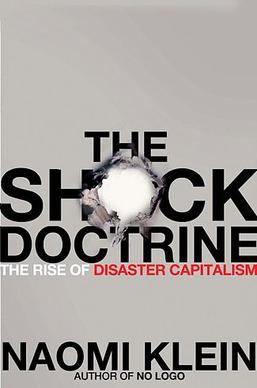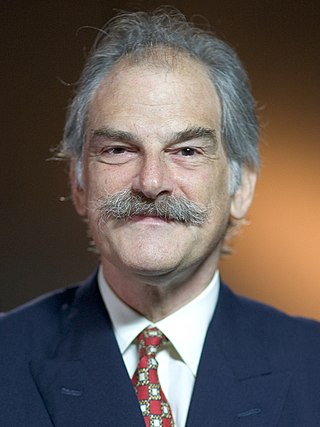Related Research Articles

The International Monetary Fund (IMF) is a major financial agency of the United Nations, and an international financial institution funded by 191 member countries, with headquarters in Washington, D.C. It is regarded as the global lender of last resort to national governments, and a leading supporter of exchange-rate stability. Its stated mission is "working to foster global monetary cooperation, secure financial stability, facilitate international trade, promote high employment and sustainable economic growth, and reduce poverty around the world."

Naomi Klein is a Canadian author, social activist, and filmmaker known for her political analyses; support of ecofeminism, organized labour, and criticism of corporate globalization, fascism and capitalism. In 2021, Klein took up the UBC Professorship in Climate Justice, joining the University of British Columbia's Department of Geography. She has been the co-director of the newly launched Centre for Climate Justice since 2021.
Special drawing rights are supplementary foreign exchange reserve assets defined and maintained by the International Monetary Fund (IMF). SDRs are units of account for the IMF, and not a currency per se. They represent a claim to currency held by IMF member countries for which they may be exchanged. SDRs were created in 1969 to supplement a shortfall of preferred foreign exchange reserve assets, namely gold and U.S. dollars. The ISO 4217 currency code for special drawing rights is XDR and the numeric code is 960.

In economics, shock therapy is a group of policies intended to be implemented simultaneously in order to liberalize the economy, including liberalization of all prices, privatization, trade liberalization, and stabilization via tight monetary policies and fiscal policies. In the case of post-Communist states, it was implemented in order to transition from a command economy to a market economy. More recently, it has been implemented in Argentina by the administration of Javier Milei.

Stanley Fischer is an Israeli-American economist who served as the 20th vice chair of the Federal Reserve from 2014 to 2017. Fischer previously served as the 8th governor of the Bank of Israel from 2005 to 2013. Born in Northern Rhodesia, he holds dual citizenship in Israel and the United States. He previously served as First Deputy Managing Director of the International Monetary Fund and as Chief Economist of the World Bank. On January 10, 2014, President Barack Obama nominated Fischer to the position of Vice Chair of the Federal Reserve. He is a senior advisor at BlackRock. On September 6, 2017, Stanley Fischer announced that he was resigning as Vice-Chair for personal reasons effective October 13, 2017.

Kenneth Saul Rogoff is an American economist and chess Grandmaster.

Olivier Jean Blanchard is a French economist and professor. He is Robert M. Solow Professor Emeritus of Economics at the Massachusetts Institute of Technology, Professor of Economics at the Paris School of Economics, and as the C. Fred Bergsten Senior Fellow at the Peterson Institute for International Economics.
Capital controls are residency-based measures such as transaction taxes, other limits, or outright prohibitions that a nation's government can use to regulate flows from capital markets into and out of the country's capital account. These measures may be economy-wide, sector-specific, or industry specific. They may apply to all flows, or may differentiate by type or duration of the flow.

Agustín Guillermo Carstens Carstens is a Mexican economist who has served as the general manager of the Bank for International Settlements since 1 December 2017. He served as governor of the Bank of Mexico from 1 January 2010 to 30 November 2017. In 2011, Carstens, along with Christine Lagarde, was one of the two final candidates to become the managing director of the International Monetary Fund. He previously served as secretary of finance in the cabinet of Felipe Calderón (2006–09), as deputy managing director of the International Monetary Fund (2003–06) and as treasurer of the Bank of Mexico. In 2011 he was included in the 50 Most Influential ranking of Bloomberg Markets Magazine. Carstens took up his appointment as the general manager at the Bank for International Settlements in Basel, Switzerland, where he was appointed to a five-year term, starting on 1 December 2017.

Maurice Moses "Maury" Obstfeld is a professor of economics at the University of California, Berkeley and previously Chief Economist at the International Monetary Fund. He is also a nonresident senior fellow at the Peterson Institute for International Economics.

The Shock Doctrine: The Rise of Disaster Capitalism is a 2007 book by Canadian author and social activist Naomi Klein. In the book, Klein argues that neoliberal economic policies promoted by Milton Friedman and the Chicago School of Economics have risen to global prominence because of a deliberate strategy she calls "disaster capitalism". In this strategy, political actors exploit the chaos of natural disasters, wars, and other crises to push through unpopular policies such as deregulation and privatization. This economic "shock therapy" favors corporate interests while disadvantaging and disenfranchising citizens when they are too distracted and overwhelmed to respond or resist effectively. The book challenges the narrative that free market capitalist policies have been welcomed by the inhabitants of regions where they have been implemented, and it argues that several man-made events, including the Iraq War, were intentionally undertaken with the goal of pushing through these unpopular policies in their wake.

A global recession is a recession that affects many countries around the world—that is, a period of global economic slowdown or declining economic output.

The 2007–2008 financial crisis was followed by a global resurgence of interest in Keynesian economics among prominent economists and policy makers. This included discussions and implementation of economic policies in accordance with the recommendations made by John Maynard Keynes in response to the Great Depression of the 1930s, particularly fiscal stimulus and expansionary monetary policy.
The chief economist of the International Monetary Fund (IMF) is the economic counsellor and director of the fund's Research Department. He is responsible for providing independent advice to the fund on its policy issues, integrating ideas of research in design of policies, conveying these ideas to the policymakers inside and outside the fund and managing all research done at IMF. The chief economist is a member of the Senior Leadership of the IMF.

John Phillip Lipsky is an American economist. He was the acting managing director of the International Monetary Fund from May to July 2011. He assumed the post of acting managing director after Dominique Strauss-Kahn was arrested in May 2011 accused of sexual assault. After the appointment of Christine Lagarde he returned to his post as the first deputy managing director of the IMF. He retired from the IMF in November 2011 and is currently a distinguished visiting scholar at Johns Hopkins School of Advanced International Studies (SAIS).

Klaas Henderikus Willem Knot is a Dutch economist and central banker who is the current president of the Dutch central bank De Nederlandsche Bank (DNB). In this capacity he serves as a member of the Governing Council of the European Central Bank (ECB), as well as of the board of governors of the International Monetary Fund (IMF). Knot also holds a position as Professor in Monetary Stability at the University of Amsterdam and honorary professor at the University of Groningen.

Gita Gopinath is an Indian-American economist who has served as the first deputy managing director of the International Monetary Fund (IMF), since 21 January 2022. She had previously served as chief economist of the IMF between 2019 and 2022.

YannisStournaras is a Greek economist who has been the Governor of the Bank of Greece since June 2014.
Atif Rehman Mian is a Pakistani-American economist who serves as the John H. Laporte Jr. Class of 1967 Professor of Economics, Public Policy, and Finance at Princeton University, and as the director of the Julis-Rabinowitz Center for Public Policy and Finance at the Princeton School of Public and International Affairs. He received a Guggenheim Fellowship in 2021, and was elected Fellow of the Econometric Society in 2021.
Vietnam joined the International Monetary Fund (IMF) on September 21, 1956, under the policy of Article VIII. Their quota contributes an estimated SDR of 1,153 millions and voting power of 0.24%. As of August 2016, the current IMF Resident Representative to Vietnam is Jonathan Dunn.
References
- ↑ Kevin Danaher (1994). 50 Years is Enough: The Case Against the World Bank and the International Monetary Fund. South End Press. pp. 20–. ISBN 978-0-89608-495-7.
- 1 2 K. M. Seethi (31 July 2016). "Enough Is 'Not' Enough: Is Kerala Poised For Social Darwinism?". Countercurrents. Retrieved 11 June 2018.
- ↑ Naomi Klein, The Shock Doctrine, p262
- ↑ "Proven: IMF brings down economies intentionally". Skwawkbox.org. 27 August 2012. Retrieved 11 June 2018.